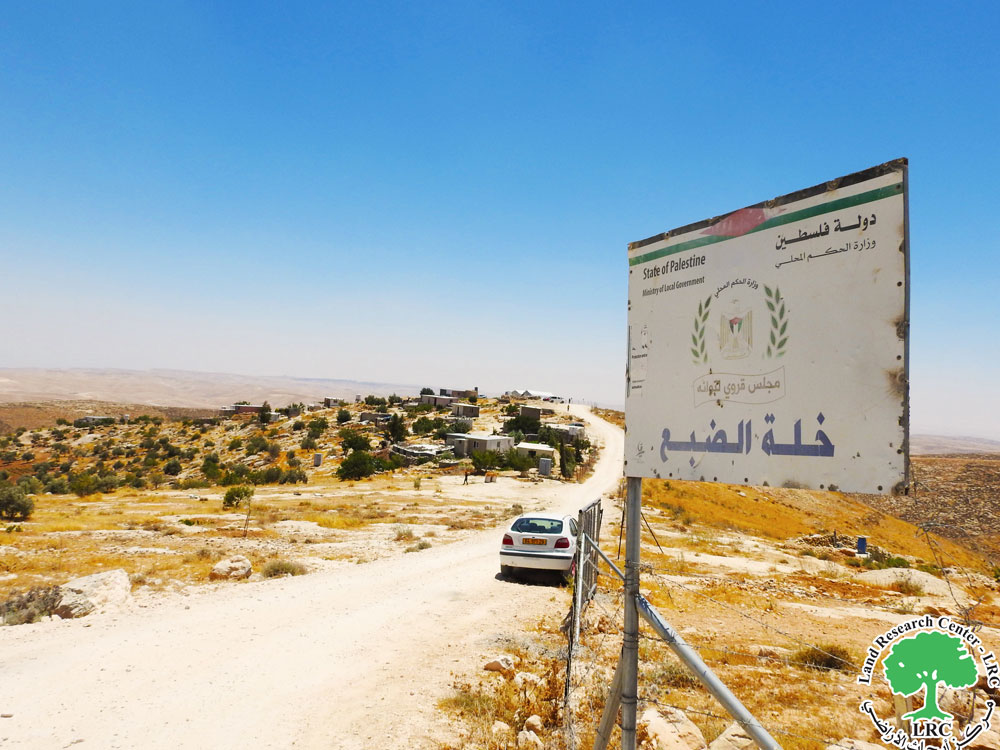2024-05-14
Illegal Colonists violate citizens plants in Khallet Ad-Dabe'a in Masafer Yatta / Hebron governorate

View of Khirbet al-Dab'a – Masafer Yatta
Violation: Grazing and vandalizing crops
Date of violation: May 14, 2024
Location: Khirbet al-Dab'a, Masafer Yatta / Hebron Governorate
Perpetrators: Colonists
Affected party: Farmers from the Dababsah family
Details:
Colonists destroyed the crops and trees of local farmers by grazing their livestock on them, causing significant damage and losses in the village of Khirbet al-Dab'a in Masafer Yatta, south of Hebron. Jaber Ali Mohammed Dababsah, one of the affected farmers, told the Land Research Center:
"On the morning of Tuesday, May 14, 2024, two colonists, each with herds of livestock, gathered near our village. One arrived with his herd from the settlement of “Mitzpe Yair”, while the other came from “Avigal”. They set up tents on a hill across from our village and then released their livestock onto our family’s land, which was planted with wheat, barley, and fruit trees."
Dababsah mentioned that the two colonists had around 300 animals that devoured the fields of wheat, barley, and the orchards, destroying approximately 50 dunams of land. He added that the colonists, about 5-6 in total, who were grazing the livestock were armed, while Israeli soldiers were watching nearby.
The damaged lands belong to:
Jaber Ali Dababsah: Wheat and barley fields ready for harvest over about 10 dunams
Mohammed Badawi Dababsah: Wheat and barley fields over about 15 dunams
Adnan Mohammed Dababsah: Wheat fields and an almond grove over about 10 dunams
Saud Mahmoud Dababsah: Almond, grape, and olive trees over about 15 dunams
Dababsah noted that the colonists deprived the residents of their crops, which they rely on for feeding their families and livestock. Farmers affected were anticipating this harvest season for wheat and barley, not only to provide food for their families but also to gather straw for animal fodder. The affected families also raise livestock, which is their primary source of food and income, and they depend heavily on their crops.
Khirbet al-Dab'a Village[1]:
Located east of Yatta, Khirbet al-Dab'a is one of the population centers in Masafer Yatta, home to about 100 individuals who rely on farming, livestock raising, and dairy production. The village falls under the administration of the Masafer Yatta Village Council, which manages all the nearby population centers around Yatta. The village is connected to Yatta by a rough dirt road, like many other communities in Masafer Yatta. Most houses in the village are made of concrete blocks with tin roofs, and there are no public services available.
Legal Commentary:
The Palestinian environment is subjected to numerous environmental violations by the Israeli occupation, disregarding all international and national laws and conventions related to the protection of environmental rights. The right to live in a clean and healthy environment is inherently tied to human existence. The occupation often attempts to present itself as a caretaker of international environmental concerns, despite signing major agreements aimed at environmental protection, such as the Basel Convention in 1989, the Rotterdam Convention in 2008, the Stockholm Convention in 2001, and the Ramsar Convention in 1971, as well as air quality and climate charters. Nonetheless, it continues to violate all these treaties without accountability or oversight.
Additionally, there are specific texts regarding the right to enjoy a clean and healthy environment for all those living under military occupation, according to international laws, conventions, and treaties. For instance, the International Covenant on Economic, Social and Cultural Rights, adopted by the United Nations General Assembly in Resolution 2200 (D-21) on December 16, 1966, states in Article 1, paragraph 2: "... all people, in pursuit of their own development, have the right to freely dispose of their natural wealth and resources without prejudice to any obligations arising from the international economic cooperation based on the principle of mutual benefit and international law. In no case may a people be deprived of its own means of subsistence..."
Undoubtedly, the attacks carried out by the Israeli side violate the laws of the "occupying state" before violating any other laws. A closer look at this situation reveals that the Israeli Penal Law of 1977 and its amendments stipulate that the infringement of others' property constitutes a punishable offense. Article 447 states that: "Anyone who does any of the following with the intent to intimidate, insult, or harass the property owner, or to commit a crime, is punishable by imprisonment for two years: (1) enters or crosses the property; (2) remains on the property unlawfully after entering it legally."
Furthermore, a crime under this section is committed when the offender carries a firearm or a sharp weapon, punishable by four years of imprisonment. Reading this provision indicates that the Israeli Penal Law criminalizes mere unauthorized entry into someone else's property with the intent to insult or harass, and punishes such acts with two years in prison. The penalty is doubled if the offender enters and commits a crime on someone else’s property using a weapon or a sharp tool, or even through overgrazing, which is explicitly prohibited by this legal text.
Thus, the Israeli aggressor blatantly violates both international laws and treaties, as well as the internal laws of its "state." Consequently, the Israeli judiciary should hold settlers accountable for these actions based on their legal texts. However, there is no legal accountability for the aggressor from the Israeli judiciary. Nevertheless, this does not negate any individual's right to live in a clean, safe, and unviolated environment.
[1]Source: Geographic Information Systems Unit – Land Research Center.
مشروع: حماية الحقوق البيئية الفلسطينية في مناطق "ج" SPERAC IV -GFFO
Disclaimer: The views and opinions expressed in this report are those of Land Research Center and do not necessarily reflect the views or positions of the project donor; the Norwegian Refugee Council.
إخلاء المسؤولية: الآراء ووجهات النظر الواردة في هذا التقرير هي آراء ووجهات نظر مركز أبحاث الأراضي ولا تعكس بالضرورة وجهات نظر أو مواقف الجهة المانحة للمشروع؛ المجلس النرويجي. للاجئين
